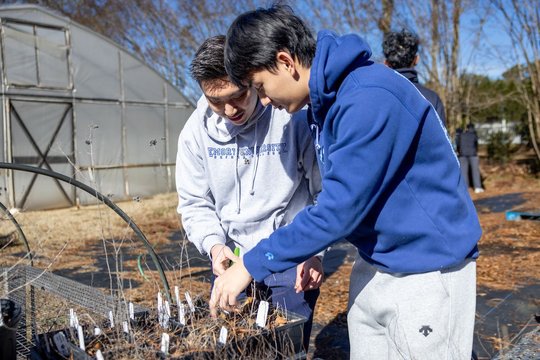Courtesy of Oxford School
On Jan. 20, greater than 60 Oxford School scholars, group of workers and nation contributors bundled up towards the chilly to assistance a number of nation companions all through Emory’s annual MLK Week of Carrier.
“With temperatures forecast to be in the 20s, we pivoted our two outdoor projects,” says Megan Hulgan, Oxford’s laborer director of Pupil Involvement, Management and Transitions (SILT). “Instead of removing invasive plants from the trail behind the Oxford College Organic Farm, our volunteers worked inside the farm greenhouse to support the farm’s production of native plants. At Best Friends Farm, a local animal sanctuary, students assisted with tasks in the barn and in the chicken coop.”
Scholars and group of workers additionally served in the back of the scenes at Giving Arms Meals Pantry and the Salvation Military through cleansing, organizing and sorting donations.
“Salvation Army volunteers prepped hundreds of articles of clothing to be sold at the thrift store or given to our neighbors in need free of charge,” Hulgan says. In addition they realized about products and services the Salvation Military deals to unhoused neighbors, folks suffering from the justice gadget and others.
Farmer/professor Daniel Parson had enough duties to book the Oxford Natural Farm volunteers busy, in spite of the trade in plans. Scholars made potting park, tidied the greenhouse, trimmed and prepped local crops that had been already rising, and planted 10 residences of local seeds in order that extra may also be grown.
“Our native plant program is an important part of the farm by providing pest control and increasing biodiversity,” Parson explains. “We are able to sell some of the plants, getting them into the community and providing funding for our activities. We also partner with the City of Oxford on their right-of-way meadows, so some of the plants may end up there.”
Even supposing the presen used to be chilly plenty to briefly freeze any aqua outdoor, Oxford Farm volunteers spent a lot in their pace within the greenhouse — the place it used to be a heat 70 levels.
Then their shifts had been whole, volunteers amassed for lunch and post-event reflections.
“We swapped stories of the work we completed and the local issues we learned about,” Hulgan says. “We concluded with reflection on how we can engage in the ongoing work to reach Dr. King’s vision of a beloved community.
“Our community is committed to the environmental justice missions of these organizations,” she provides. “I’m not surprised that students, staff and campus partners got their hands dirty and supported this work despite the below-freezing temperatures.”
